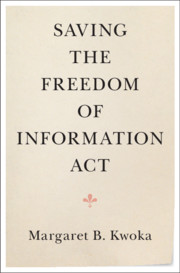Introduction
Published online by Cambridge University Press: 08 October 2021
Summary
Emma Quezada and her three US citizen children were living in the home she owns in the United States when she consulted an attorney and found she was eligible for lawful permanent resident (LPR) status – that is, to become a green-card holder. LPRs have many coveted rights in the United States, including work authorization, the ability to travel internationally, and a path to citizenship. Quezada’s attorney filed her application to become an LPR; but to complete the process, Quezada needed to provide evidence that she was lawfully admitted into the country the first time she entered the United States. To get that documentation, Quezada filed a request with the US Citizenship and Immigration Services (USCIS) agency under the Freedom of Information Act (FOIA), asking for a record of her admission. Then, she waited twenty-two months, all while lacking the security of a green card.1 She finally became a named plaintiff in a class action lawsuit brought to enforce FOIA’s mandate that the government respond to requests for information within twenty business days.2
- Type
- Chapter
- Information
- Saving the Freedom of Information Act , pp. 1 - 8Publisher: Cambridge University PressPrint publication year: 2021



